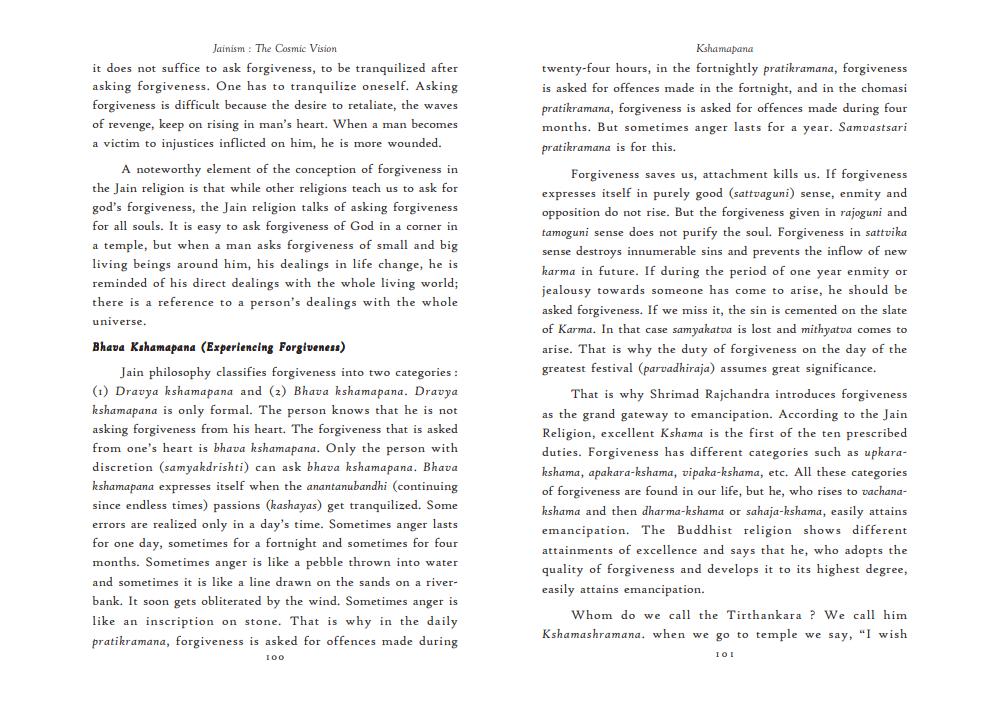________________
Jainism: The Cosmic Vision
it does not suffice to ask forgiveness, to be tranquilized after asking forgiveness. One has to tranquilize oneself. Asking forgiveness is difficult because the desire to retaliate, the waves of revenge, keep on rising in man's heart. When a man becomes a victim to injustices inflicted on him, he is more wounded.
A noteworthy element of the conception of forgiveness in the Jain religion is that while other religions teach us to ask for god's forgiveness, the Jain religion talks of asking forgiveness for all souls. It is easy to ask forgiveness of God in a corner in a temple, but when a man asks forgiveness of small and big living beings around him, his dealings in life change, he is reminded of his direct dealings with the whole living world; there is a reference to a person's dealings with the whole universe.
Bhava Kshamapana (Experiencing Forgiveness)
Jain philosophy classifies forgiveness into two categories: (1) Dravya kshamapana and (2) Bhava kshamapana. Dravya kshamapana is only formal. The person knows that he is not asking forgiveness from his heart. The forgiveness that is asked from one's heart is bhava kshamapana. Only the person with discretion (samyakdrishti) can ask bhava kshamapana. Bhava kshamapana expresses itself when the anantanubandhi (continuing since endless times) passions (kashayas) get tranquilized. Some errors are realized only in a day's time. Sometimes anger lasts for one day, sometimes for a fortnight and sometimes for four months. Sometimes anger is like a pebble thrown into water and sometimes it is like a line drawn on the sands on a riverbank. It soon gets obliterated by the wind. Sometimes anger is like an inscription on stone. That is why in the daily pratikramana, forgiveness is asked for offences made during
100
Kshamapana twenty-four hours, in the fortnightly pratikramana, forgiveness is asked for offences made in the fortnight, and in the chomasi pratikramana, forgiveness is asked for offences made during four months. But sometimes anger lasts for a year. Samvastsari pratikramana is for this.
Forgiveness saves us, attachment kills us. If forgiveness expresses itself in purely good (sattvaguni) sense, enmity and opposition do not rise. But the forgiveness given in rajoguni and tamoguni sense does not purify the soul. Forgiveness in sattvika sense destroys innumerable sins and prevents the inflow of new karma in future. If during the period of one year enmity or jealousy towards someone has come to arise, he should be asked forgiveness. If we miss it, the sin is cemented on the slate of Karma. In that case samyakatva is lost and mithyatva comes to arise. That is why the duty of forgiveness on the day of the greatest festival (parvadhiraja) assumes great significance.
That is why Shrimad Rajchandra introduces forgiveness as the grand gateway to emancipation. According to the Jain Religion, excellent Kshama is the first of the ten prescribed duties. Forgiveness has different categories such as upkarakshama, apakara-kshama, vipaka-kshama, etc. All these categories of forgiveness are found in our life, but he, who rises to vachanakshama and then dharma-kshama or sahaja-kshama, easily attains emancipation. The Buddhist religion shows different attainments of excellence and says that he, who adopts the quality of forgiveness and develops it to its highest degree, easily attains emancipation.
Whom do we call the Tirthankara? We call him Kshamashramana. when we go to temple we say, "I wish
101




